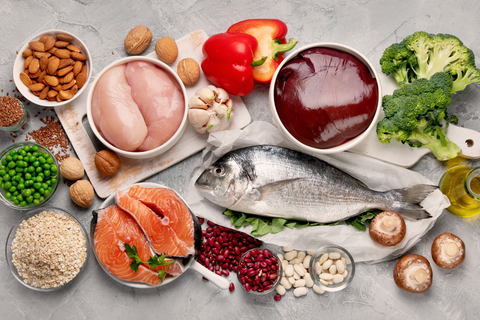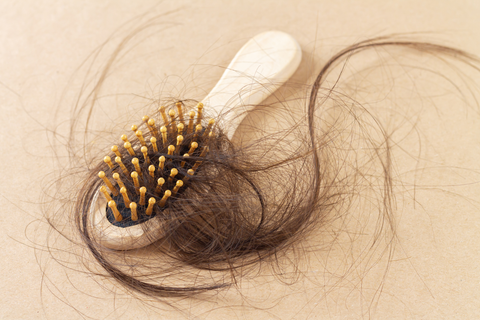
Selenium: The Underestimated Mineral For Preventing Hair Loss And Boosting Scalp Health
Selenium, often overshadowed by more well-known nutrients, is a mineral that plays an important role in maintaining healthy hair.
Despite its low profile, selenium offers powerful benefits for scalp health and hair vitality, particularly for women seeking to prevent hair loss and stimulate hair growth.
This mineral is not only crucial for the proper functioning of the human body but also for fostering a thriving environment for hair follicles.
In this article, we will explore the various facets of selenium — from its basic characteristics to its significant impact on hair health.
We aim to shed light on why incorporating selenium into your daily regimen could be the key to unlocking stronger, healthier, and more resilient hair.
Our Anti-Gray Vitamins stand out as an exceptional source of selenium and other hair-health-promoting nutrients.
By integrating this supplement into your daily routine, you can leverage the power of selenium and a curated blend of ingredients aimed at combating gray hair and enhancing overall hair vitality.

I LOVE MY HAIR NOW
FullyVital hair serum and hair vitamins made tremendous improvements in my hair. I truly love my hair now.
Shop Hair ProductsWhat Is Selenium And Where Can You Find It?
Selenium is a trace mineral that is found naturally in the soil and absorbed by plants, making its way into our diet through various food sources.
It is essential for many bodily functions and plays a crucial role in the immune system, metabolism, and most notably, hair health.
Despite its importance, only a small amount of selenium is needed, which makes it crucial to consume this mineral in the right quantities.
Excellent sources of selenium include Brazil nuts, eggs, sunflower seeds, fish, and poultry.
How Does Selenium Support Hair Health?
Research has revealed that selenium is integral for the synthesis of selenoproteins, which are vital for the regeneration of antioxidants in the body and for the protection of cells from oxidative stress — a common culprit behind hair loss and scalp issues.
Oxidative stress can damage hair follicles, leading to weaker hair growth, hair loss, and less vibrant hair.
Selenium's antioxidant properties help mitigate this damage, supporting the integrity of hair follicles and promoting healthier hair growth.
this damage, supporting the integrity of hair follicles and promoting healthier hair growth.How Does Selenium Prevent Hair Loss?
Fights Hair Loss
Selenium's antioxidant properties are at the forefront of fighting hair loss.
By neutralizing free radicals, selenium protects hair follicles from damage that can lead to hair shedding and thinning.
Moreover, selenium is essential in the activation of thyroid hormones, which regulate hair growth cycles.
An imbalance in these hormones can lead to hair loss, making selenium an important nutrient for hormonal balance and, consequently, hair retention.
Creates A Healthy Scalp
A healthy scalp is the foundation of healthy hair growth.
Selenium aids in the eradication of dandruff and reduces inflammation, common issues that can hinder hair growth.
By maintaining a healthy scalp environment, selenium ensures that hair follicles are robust and can support strong, healthy hair growth.
How Do I Incorporate Selenium Into My Diet?
Integrating selenium into your diet is a straightforward yet effective strategy for enhancing hair health.
This section will guide you through various dietary sources of selenium and provide tips for optimizing your selenium intake for hair vitality.
Eating Selenium-Rich Foods
To harness the hair health benefits of selenium, consider incorporating the following selenium-rich foods into your diet:
- Brazil nuts: Just one or two Brazil nuts can provide your daily recommended intake of selenium.
- Seafood: Fish like tuna, halibut, and sardines are excellent sources of selenium.
- Meat: Beef, liver, and chicken offer good amounts of selenium.
- Grains: Whole grains, including bread and cereals, can contribute to your selenium intake.
- Eggs: A versatile and accessible source, eggs are also rich in selenium.

Balance Your Selenium Intake
While selenium is beneficial, too much can lead to selenium toxicity, a condition marked by symptoms such as hair loss, nail changes, and nausea.
To avoid this, adhere to the recommended dietary allowance (RDA) for selenium, which varies by age, gender, and life stage.
Generally, adult women should aim for 55 micrograms per day.
It's crucial to balance your intake and consult with a healthcare provider before starting any new supplement regimen.
What Are The Potential Risks When Taking Selenium?
While selenium is essential for hair health and overall wellness, it’s important to approach its consumption with caution.
This section addresses the potential risks associated with excessive selenium intake and considerations to keep in mind.
Selenium Overdose
Excessive intake of selenium, especially from supplements, can lead to selenosis, a condition characterized by symptoms such as gastrointestinal upset, hair loss, fatigue, and irritability.
Chronic selenium toxicity can have more severe consequences, including neurological issues and even heart problems.
Therefore, it's crucial to monitor your selenium intake and ensure it does not exceed the recommended levels.
Special Considerations For Certain Individuals
Certain individuals should be particularly mindful when it comes to selenium consumption.
Pregnant and breastfeeding women must adhere to the recommended selenium levels to prevent complications.
Those with specific health conditions, such as kidney disease, might need to adjust their selenium intake accordingly.
Additionally, people residing in areas where the soil naturally contains high selenium levels should be cautious to prevent excessive consumption of locally sourced selenium-rich foods.
Monitoring and adjusting your selenium intake based on these factors can help maintain optimal health and avoid potential risks.
What Are The Common Myths And Misconceptions About Selenium And Hair Health?
Myth 1: More Selenium Equals Healthier Hair
One common misconception is that the more selenium you consume, the healthier your hair will be.
However, selenium follows the principle of 'less is more.'
The body requires this mineral in small quantities, and excessive intake can lead to selenosis, a condition marked by hair loss, nail brittleness, and other health issues.
It's essential to consume selenium in moderation, adhering to the recommended daily allowance (RDA).
Myth 2: Selenium Supplements are Necessary for Everyone
Not everyone needs to take selenium supplements.
The necessity for supplementation largely depends on one's dietary intake and geographic location, as soil selenium levels vary globally.
Before starting any supplement regimen, it's advisable to consult with a healthcare professional to determine if you have a deficiency.
Myth 3: Selenium Alone Can Prevent Hair Loss
While selenium plays a crucial role in hair health, attributing hair loss prevention solely to this mineral is misleading.
Hair loss can result from various factors, including genetics, hormonal changes, and nutritional deficiencies.
A holistic approach involving a balanced diet and proper hair care is more effective in maintaining hair health.

Tap Into Nature's Essence With Fully VitalUncover the ancient secret to radiant, robust hair through the treasures of the Mediterranean. Fully Vital encourages you to integrate the nourishing power of olive oil into your hair maintenance practices. Witness your hair's transformation and pamper it with nature's purest offerings.
Start Your Path to Enhanced Hair Health with Fully Vital Now! |
Final Thoughts
Selenium, an often underestimated mineral, holds significant promise for enhancing hair health, particularly for those struggling with hair loss and scalp conditions.
Its powerful antioxidant properties and role in hormonal balance make it a key nutrient for maintaining strong, healthy hair.
By incorporating selenium-rich foods into your diet and being mindful of the recommended intake levels, you can leverage selenium's benefits while avoiding the pitfalls of excess.
Remember, while selenium is beneficial, it's only one part of a holistic approach to hair health.
A balanced diet, proper hair care practices, and regular consultations with healthcare professionals are crucial for achieving and maintaining healthy hair.
Start small by introducing selenium-rich foods into your meals and observe how your hair responds.
With the right approach, selenium can be a valuable addition to your hair care regimen, helping you achieve the luscious, healthy locks you desire.
Incorporating Fully Vital's Anti-Gray Vitamins into your regimen can enhance this holistic approach by providing not only selenium but also other vital nutrients aimed at improving hair health and color.
By adding these vitamins to your daily routine, you're taking a comprehensive step towards maintaining vibrant, healthy locks and combating the onset of grays.
Read also:
- Effective Ways To Address A Mature Hairline: Insights And Remedies
- Say Goodbye To Dryness: Best Shampoos For Dry Hair Revealed
- Discover The Power Of Scalp Detox For Radiant Hair
Frequently Asked Questions
Can I take too much selenium?
Yes, excess selenium can be toxic.
Don't exceed recommended dosages.
What are other minerals good for hair health?
Zinc, iron, and biotin are also important for hair.
Can I get enough selenium from food?
Yes, sources include Brazil nuts, seafood, eggs, and whole grains.
Should I take a hair supplement with selenium?
Consult a doctor.
You might already get enough from food or a multivitamin.
How long does it take for selenium to improve hair health?
It can take weeks or months to see results.
Does topical selenium help hair loss?
There's limited research on topical application for hair loss specifically.
Is selenium good for all hair types?
Selenium can benefit most hair types, but consult a doctor for specific concerns.
Is selenium better than biotin for hair loss?
Benefits vary.
Biotin might be more helpful for deficiency-related hair loss.
Can selenium interact with other medications?
Yes, it can interact with thyroid medication and others.
Talk to your doctor.
Should I take selenium with food?
Maybe. Taking it with protein might enhance absorption, but consult your doctor.
Sources:
- Shiobara, Y., Yoshida, T., & Suzuki, K. T. (1998). Effects of dietary selenium species on Se concentrations in hair, blood, and urine. Toxicology and applied pharmacology, 152(2), 309-314.
- Pincemail, J., & Meziane, S. (2022). On the potential role of the antioxidant couple vitamin E/selenium taken by the oral route in skin and hair health. Antioxidants, 11(11), 2270.
- Piccinini, L., Borella, P., Bargellini, A., Medici, C. I., & Zoboli, A. (1996). A case-control study on selenium, zinc, and copper in plasma and hair of subjects affected by breast and lung cancer. Biological trace element research, 51, 23-30.
- Li, M., Yun, H., Huang, J., Wang, J., Wu, W., Guo, R., & Wang, L. (2021). Hair selenium content in middle-aged and elderly Chinese population. Biological Trace Element Research, 199, 3571-3578.
- Hwang, S. W., Lee, H. J., Suh, K. S., Kim, S. T., Park, S. W., Hur, D. Y., ... & Sung, H. S. (2011). Changes in murine hair with dietary selenium excess or deficiency. Experimental dermatology, 20(4), 367-369.






